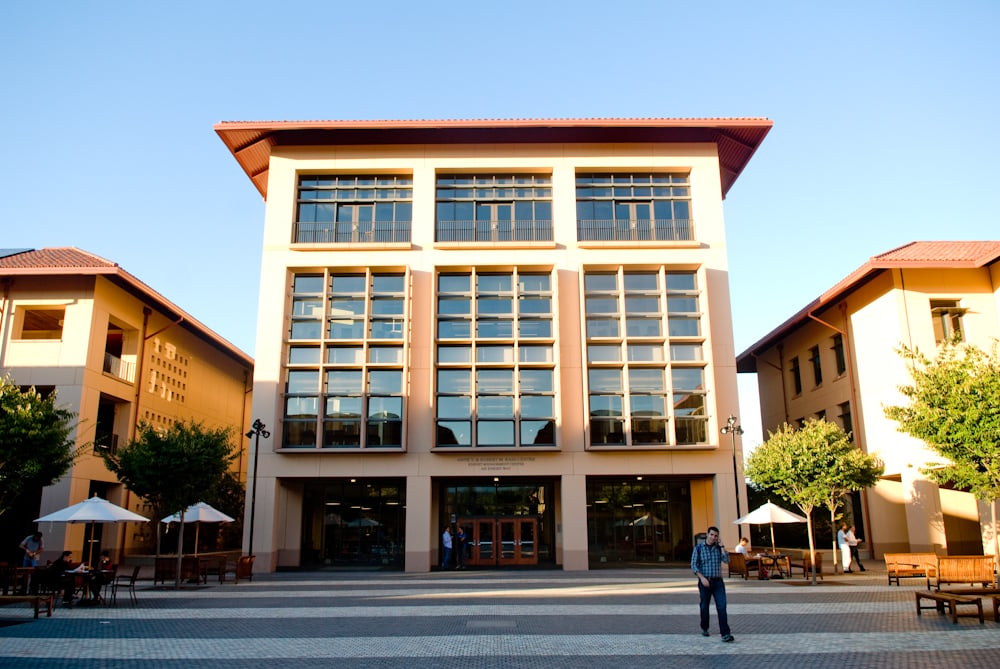Stanford students, faculty and staff advocated for a multidisciplinary approach to creating sustainability at Stanford at a town hall conversation on Friday.
About two dozen members of the Stanford community gathered for a discussion at the Knight Management Center to discuss how the University might coordinate its sustainability efforts across departments as part of its long-range plan. Friday’s meeting drew a number of Stanford Graduate School of Business (GSB) students, and talk turned to how Stanford can connect the business school to environmental work happening in other areas of the University. Several attendees proposed making environmental education a graduation requirement for GSB students.
The town hall was the last of five forums this quarter at which a sustainability committee solicited input from faculty, staff and students. The committee includes faculty from all seven of Stanford’s schools, and is led by mechanical engineering professor Arun Majumdar and earth systems professor Noah Diffenbaugh. Its stated focus is on how Stanford should be organized in order to achieve its new sustainability goals.
“I’m sorry I was a little late,” said Majumdar as he stood to speak, eliciting laughter. “I was having a phone call with the Chief Sustainability Officer of Microsoft.”
Majumdar noted that Microsoft aims to become carbon-negative by 2030, citing the company as an example of businesses’ role in working toward sustainability.
He then asked for audience members’ thoughts on whether Stanford is well-configured to address the sustainability goals outlined in Stanford’s “Long-Range Vision,” a plan unveiled last May that lays out long-term goals and themes for the University.
Several GSB students said they want to be able to connect with students and faculty from other divisions of the University more easily to create environmentally focused business initiatives.
“There’s kind of a missing connective tissue,” said MBA student Julia Osterman ’20. Osterman and other town hall attendees said the business school can feel separate from the rest of Stanford’s departments.
“A lot of business students feel that this topic [sustainability] is quite technical, and they have no science background,” said first-year MBA student Ted McKlveen. “If they saw there were a bunch of chemistry students working on this, it might be more attractive.”
McKlveen proposed making a list of sustainability problems easily accessible to students in the GSB so entrepreneurs can see potential starting points for environmentally focused businesses.
“There’s a lot of student interest, but then ultimately not a lot of people end up working in those areas, which I think is a concern,” McKlveen said.
Several students supported making environmental education a graduation requirement for GSB.
“Any macroeconomic trend is something you have to know about as a business leader,” she said. “Climate change should be taught to everyone.”
Town hall attendees from outside the GSB asked Majumdar and Diffenbaugh about Stanford’s plans for research under the Long-Range Vision.
“We’re being asked to do more than just do the research in this vision,” said Sibyl Diver ’96, Ph.D. ’17, a research scientist in the department of earth system science. “Faculty are now being asked to make an impact the way an NGO would.”
She asked how Stanford will keep faculty accountable in applying academic research beyond the academy.
Diver said working with community partners is an important but time-consuming goal that may be harder for younger, non-tenured faculty.
Business students also wanted to see more spots open in the Emmett Interdisciplinary Program in Environment and Resources (E-IPER), which accepts a limited number of MBA applicants each year.
Attendees discussed how centralized the University’s approach to sustainability should be, whether administrative bloat hinders environmental efforts and how the GSB can make its own buildings and classes more sustainable.
The committee that Majumdar and Diffenbaugh lead will provide its final report to the president and provost by the end of winter quarter, and is still soliciting feedback at [email protected]. The committee will come up with multiple options, but it will not provide specific recommendations.
Contact Jasmine Kerber at jkerber ‘at’ stanford.edu.
